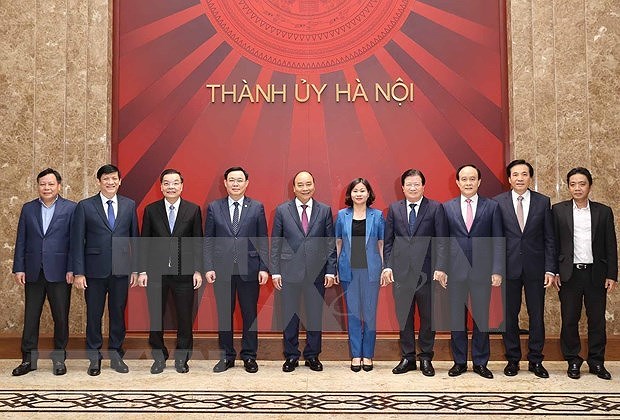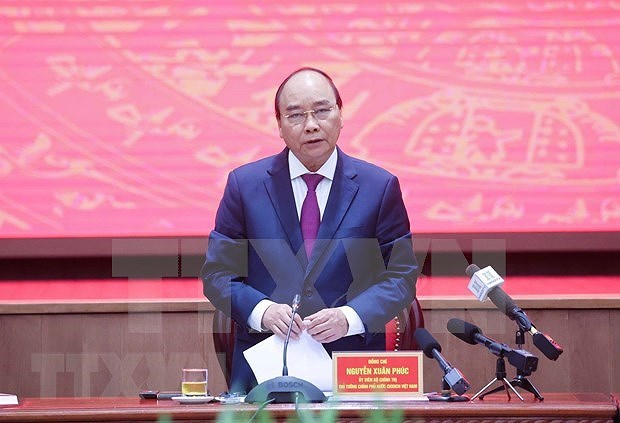Prime Minister Nguyen Xuan Phuc suggested Hanoi should pay more attention to developing satellite cities and expand the capital to both the north and the west, while continuing to build a green and clean city, during a working session on March 28 with key officials of the capital city.
 PM Nguyen Xuan Phuc in a photo with officials attending the working session (Photo: VNA)
PM Nguyen Xuan Phuc in a photo with officials attending the working session (Photo: VNA)Hanoi (VNA) – Prime Minister Nguyen Xuan Phuc suggested
Hanoi should pay more attention to developing satellite cities and expand the
capital to both the north and the west, while continuing to build a green and
clean city, during a working session on March 28 with key officials of the
capital city.
The Government leader commended Hanoi for its socio-economic achievements in
2020, as well as efforts in COVID-19 prevention and control.
He took note of encouraging signs in the city’s socio-economic
situation in the first quarter of this year, including a 5.15 percent increase
in budget collection.
At the same time, PM Phuc pointed out outstanding problems such
as the delay in planning of satellite cities and reconstruction of old
apartment buildings, adding that the city has yet to submit to the PM for approval
planning tasks for 2021-2030 with vision to 2050.
 PM Phuc speaks at the working session (Photo: VNA)
PM Phuc speaks at the working session (Photo: VNA)
Hanoi must become a cultural city, a place worth of living for residents and international friends, the PM said, urging the municipal authorities to make plans to preserve and develop the local tangible and intangible cultural heritage while building a dynamic and modern city.
PM
Phuc stressed that Hanoi should lead in implementing the Government’s
Resolution 01 on socio-economic development, and must successfully organize the
elections of deputies to the 15th National Assembly and People’s
Councils at all levels in the 2021-2026 tenure.
He approved the city’s proposals on key transport projects, the
use of public housing and land, and the adjustment of the ratio of urban and
rural land to 40/60 percent, and assigned relevant ministries and agencies to
support the city.
Chairman of Hanoi People’s Committee Chu Ngoc Anh reported that production and
business activities in the city showed clear improvements in the
January-February period, with a 5.17 percent growth in GRDP. The city attracted
101.5 million USD in foreign direct investment and over 3.2 trillion VND in
domestic investment. It collected more than 72.7 trillion VND for the State
budget, fulfilling 30.9 percent of the yearly estimate assigned by the
government.
However, the tourism sector is still in difficulties due to
COVID-19, with total arrivals at 280,000 in the three-month period, down 87.7
percent year on year.
The city has basically put COVID-19 under control with 40 consecutive
days free of new cases by March 28. Hanoi recorded a total 242 cases of
COVID-19 since early 2020, with 37 cases from January 27 this year when the new
wave of COVID-19 began.
Hanoi recently announced the zoning plan for the four inner-city districts of Hoan Kiem, Ba Dinh, Dong Da, and Hai Ba Trung, which are at the heart of and historically significant to the capital of Vietnam.
The zoning plan regulates the physical development of the four districts and limits the use of land and buildings.
The four districts are of historic significance, with the main uses of land and buildings limited to commercial, services, tourism, residential, and for the public, said Nguyen Trong Ky Anh, Deputy Director of the Hanoi Department of Planning and Architecture.
About 215,000 residents will be moved out of the four districts from 2020 to 2030 to reduce the population to 672,000.
Under the plan, a network of walking routes, public works, and metro stations will also be constructed underground.
According to Nguyen Duc Hung, Deputy Director of the Hanoi Urban Planning Institute, a number of production facilities, companies, and headquarters of ministries and governmental agencies will be relocated from the inner-city districts to provide space for the development of public works, schools, tree planting, and others./.